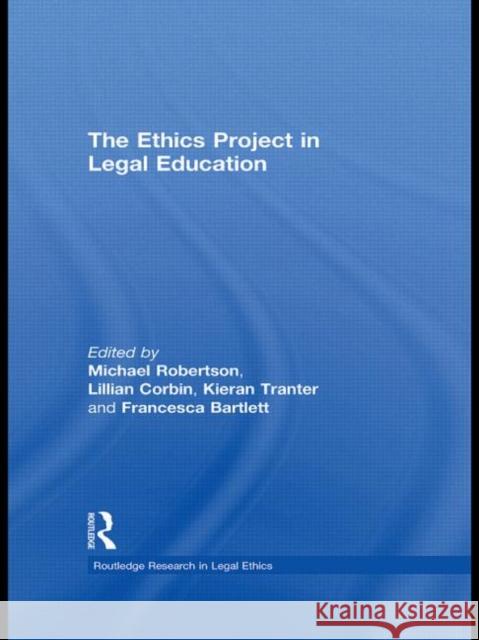The Ethics Project in Legal Education » książka
The Ethics Project in Legal Education
ISBN-13: 9780415546515 / Angielski / Twarda / 2010 / 238 str.
The Ethics Project in Legal Education
ISBN-13: 9780415546515 / Angielski / Twarda / 2010 / 238 str.
(netto: 699,68 VAT: 5%)
Najniższa cena z 30 dni: 705,23
ok. 22 dni roboczych.
Darmowa dostawa!
The contributions in this volume suggest that "the ethics project in legal education" is increasingly an international one. Even though the strength of commitment by both the profession and the legal academy to "ethics learning" within law schools varies, two fundamental questions confront all who work in this area. First, what is it that we want our students to learn (or, perhaps, in what manner do we want our students to develop) from the teaching of "legal ethics"? Second, how can we create a learning environment that will encourage the nature and quality of learning we think is important? All the contributors to this volume take a strong stand on the importance of ethical legal practice and the role of law schools in developing students' capacities in this area. They share a belief in the essential need to encourage law students to engage with the moral dimensions of legal practice. The questions that these scholars grapple with are therefore not of the "should we be teaching this?" variety, but "how might we best to go about doing this, so that our efforts within law schools really make some difference?" Each of the chapters in this volume adds uniquely to our understanding of these matters.
There is a growing recognition that legal professional rules or codes, the ethical basis upon which legal professionals are regulated, do not always provide guidance for many of the situations that legal practitioners and other legal actors face on a daily basis. Therefore it is important to prepare future practitioners for the eventualities which they may face in practice. However, there is no template for this goal. There is nothing that sets out how legal educators can create good âethicsâ learning outcomes that help students to comprehend that lawyering is much more than just applying the rules to their clientsâ situations and, at a personal level, the conduct that is expected of them. Much more thought needs to be given to the question of the aims, scope and methodology of âlegal ethics educationâ. This book goes some way to achieving this aim, presenting the views of a number of internationally renowned legal ethicists, including Brent Cotter and David Chavkin, on the topic of the teaching of legal ethics.
The book discusses the meaning of âlegal ethicsâ, adopting the basic premise that legal practitioners need to exercise personal responsibility and choice in carrying out their work. That because the current formal rules are inadequate true engagement with ethical issues requires them to exercise judgment. While this is now a well-accepted view among legal ethicists, this is not the traditional approach to teaching legal ethics and therefore there is a need to rethink the law curriculum. The contributions to the book offer a breadth of coverage examining legal ethics teaching in a range of jurisdictions including the USA, Canada, Australia, and South Africa and Hong Kong. A number of contributors discuss design issues that cover a broad field of methods, including simulations, the pervasive use of problem-solving exercises, and real-world experiences, with some of the essays revealing their empirical findings on the effectiveness of these methods and particularly as they affect the students.











